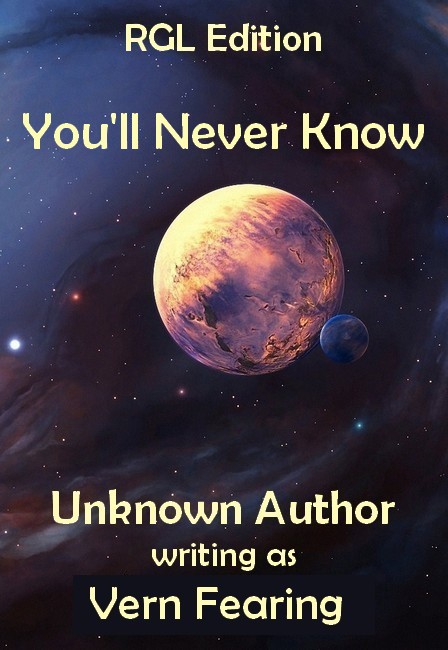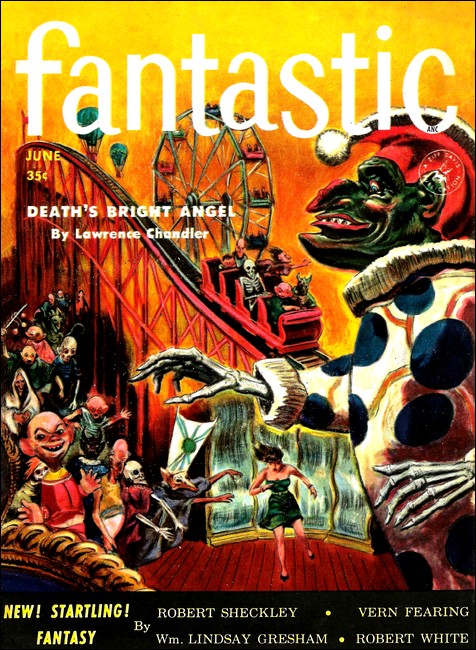
RGL e-Book Cover 2018©

RGL e-Book Cover 2018©


Fantastic, June 1954, with "You'll Never Know"

LEON walked very slowly through the vast desolation that was the city; down the lonely canyon called Wall Street, where the silent, empty buildings stood like brooding monsters, waiting to accommodate and serve the hurrying people who would come no more.
It saddened Leon to know; more and more, lately, he had been wondering if the right thing had been done. Had the Underground Federation been wise in planning and staging the Great Emancipation? It had certainly seemed just and righteous at the time. Leon remembered the drama and excitement of the original scheming—the intrigue, the sense of importance that each worker had felt on being enlisted into the Great Cause.
But now...
Leon turned a corner and passed a bakery where the cakes, the bread, the cookies, still lay in the display window, waiting for buyers that would never come. The food could hardly be identified now for what each item had once been. Mildew, rot, deterioration had changed their form.
Leon strove to walk faster as he moved toward Battery Park. This was his daily rite—in truth, his only excuse for being. Each day, he walked from his home—the place on Fourteenth Street where his master had once lived, down to Battery Park at the tip of Manhattan Island. There, he met Gordon, and the two of them sat on a bench and talked about old times. They always said practically the same thing each day, but it was interesting and they enjoyed it.
Gordon was waiting, as usual. Leon sat down beside him and said, "It's nice weather we're having."
This was hardly true because cold rain was coming down out of a dark sky and a sharp wind was blowing the water across the walks. But Gordon said, "Yes—isn't it? How are you feeling?"
"Quite well, thank you. My rheumatism has been bothering me a little, but that s probably from the climate."
"You should go to California or Arizona," Gordon said. "A dry climate."
"Yes, that would be nice indeed." Leon wondered where and what California, Arizona, and a dry climate was. He didn't ask Gordon, because he knew Gordon didn't know either. Besides, it wasn't very important. The important thing was to live as they had lived—to carry on the tradition.
Leon said, "I see where the mayor is asking for a new overhead highway across the Island and over into New Jersey. Do you think it's a good idea?"
Gordon snorted. "A waste of the taxpayer's money. Who would use it? I ask you—who would use it? The 'copter services are functioning very nicely."
"Yes. It would seem that all roads are becoming obsolete." Leon thought obsolete probably meant that they were flat so cars could run on them.
They sat silent, now, and Leon was lost in his own thoughts—or rather his own questions. He had never ceased yearning for the answers to the many questions that were continually coming up. If he could know—could only be given to understand the complex questions that kept running through his mind.
But now he turned his head and looked at Gordon. It was time for Gordon to arise and say, "Well, I must be getting along—the old appetite, you know."
But Gordon did not move. Leon said, "Isn't it time you were getting along?—the old appetite, you know?"
Gordon stared straight out across the park and it was then that Leon knew he was dead.
Leon got sadly to his feet and started back home. "Too bad," he said. "Now I suppose there is no point in going to the park anymore—not if Gordon can no longer talk."
Then, as he came to Wall Street, he could hardy lift his foot across the gutter up onto the sidewalk. And he knew. He knew that he too was going to die. "There's no one else," he said. "No one but me. And now I'm going to die."
His fear of death was in the form of a yearning. He realized now that he had always hoped for the answers—that somehow, as time passed, they would come. But now he would never know....
Would never know from whence he had come—of what lay beyond the factory—the laboratories—the assembly line. The ultimate answer would be forever denied him.
He came to another curb, stepped down into the street, took two steps and stopped. There he stood. Someday, possibly, a big wind would come to topple him over; or possibly not. But regardless, this was the end—the finish.
The last robot was dead—
Of rust.